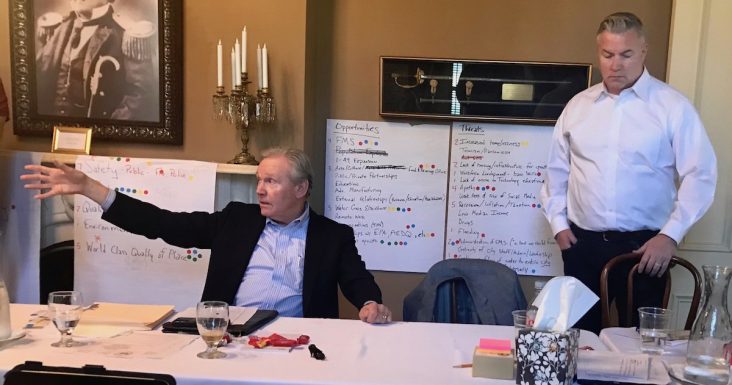Fort Smith Board reviews city strengths, weaknesses, strategies
by October 2, 2023 5:10 pm 1,287 views

Fort Smith Director Lavon Morton shares thoughts Friday (Sept. 29) during a Board of Directors session to review city strengths, weaknesses, opportunities and threats.
After analyzing the city’s strength and weakness ,the Fort Smith Board of Directors set goals that included dealing with neighborhood blight, focusing on homelessness, supporting the Foreign Military Sales (FMS) program and making the most of the city’s revenue.
Board members met for an all-day planning session Friday (Sept. 29) at the Bonneville House to work with Kendall Ross, executive director of the University of Arkansas at Fort Smith’s Center for Economic Development, who walked them through a strengths, weaknesses, opportunities and threats (SWOT) analysis and developing strategic goals for the coming year.
Directors agreed that some of the city’s biggest strengths included strong leadership, opportunity for growth, strong fiscal condition and Fort Smith being selected as the sight for the military’s FMS program.
Ebbing Air National Guard Base, home to the 188th Wing in Fort Smith and co-located with the Fort Smith Regional Airport, was selected in March by the U.S. Air Force to be the long-term pilot training center supporting F-16 and F-35 fighter planes purchased by Singapore, Switzerland, Poland, Germany, Finland and other countries participating in the Foreign Military Sales (FMS) program. Initial estimates are that 1,500 military personnel and family members will be associated with the new center once it is fully operational.
U.S. Air Force officials have said the earliest planes and pilots from foreign nations could arrive at Ebbing would be in late 2024, part of the military’s fiscal year 2025 beginning in September 2024. The full complement of 12 F-16s and 24 F-35s from various nations could arrive in fiscal year 2026 at the earliest. It has been estimated that the full cost to create an operational foreign pilot training center will range between $700 million and $800 million.
Weaknesses for the city included the city being under a federal consent decree for sewer and water infrastructure, the homeless population, water leaks, animal control, neighborhood blight and a lack of transparency on the city’s financial situation. Board members discussed wanting to know exactly where the city stood on the budget during the year, so it could make better informed decisions regarding possible new projects.
“We need to know the number of projects versus the number of dollars we’ve got. There is a lack of visibility into available funds,” Director Lavon Morton said. “We need things on paper that we can all see. And then we can, with input from the administration, determine what projects we do.”
ADDRESSING BLIGHT, HOMELESSNESS
The board discussed ways to use the city’s strength in leadership and administration along with the city’s fiscal condition to take advantage of the opportunity for growth to reduce the amount of neighborhood blight in the community. The general idea agreed upon by the board was to budget more dollars for demolition and code enforcement efforts and to pilot a proactive, grid-based code enforcement program.
Director Jarred Rego said the pilot program could be tried in a few areas of the city to start and would be proactive, contacting owners of properties before things got too bad, instead of being complaint driven. Directors also sought to see how they could use the city’s fiscal condition and the amount of philanthropy in the city to take advantage of the opportunity for public/private partnerships to reduce the threat of increased homelessness.
Director André Good said the board needed to make sure the city provides the necessary support to Next Step Day Room (NSDR) in its transition to its new location and service model. NSDR is working on a new facility on four acres on the northeast corner of South I and South Sixth streets. The property will consist of an 800-square-feet building for office and educational space as well as a kitchen.
Behind that facility, there will be 30 small individual housing units for people transitioning from homelessness, Sharon Chapman, NSDR executive director, has said. Prospective residents will submit an application for residency and will live in the units for approximately six months as they work on healthy living, getting well and getting out of homelessness, Chapman said.
The city also needs to look at implementing policies to help grow affordable housing construction, Good said.
MORE COMMUNICATION, ADMIN SUPPORT
Directors also said they would like to have an official calendar with focus on the board, to visit, meet and communicate with federal departments as well as congress, state departments, state leadership and local leadership to help reduce the burden of the consent decree while maximizing FMS and other programs.
“When we went to (Washington) DC it was eye-opening,” said Director Neal Martin, noting that just meeting with representatives with the Environmental Protection Agency and others was beneficial to the city. “It does nothing but develop those relationships in a better way.”
By keeping communication open, the city will learn about grants that are available and find help in other ways to deal with consent decree issues and more, Martin said.
The board also discussed perhaps hiring another person, though not necessarily a deputy city administrator, but someone who could help City Administrator Carl Geffken with pressing matters at times when he is needing to work more on the FMS or other other top issues. Another option mentioned would be to hire an assistant for government relations or legislative liaison.
Finally, when it comes to the future fiscal health of the city, directors agreed the city needs to use its current fiscal health to mitigate the rise of inflation and other factors that could have an impact on city services.
“If we don’t get ahead, we get behind,” Director Kevin Settle said. “We need to seriously look at all our projects and expenditures and see what are the needs and what are the wants.”
